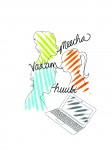The original version of this article contained multiple errors and has been changed. See the bottom of the article for additional information.
Drawing from his two decades of experience with annual healing rituals and ceremonies in southern Arizona, a UCLA professor is helping indigenous communities in the region document their language by making it available to a mass audience through a new website.
David Shorter, a UCLA professor of world arts and cultures, recently published a working prototype of the website, called Wiki for Indigenous Languages, to allow native Yaqui speakers to document the Yoem Noki language and pieces of their culture. The language is spoken in indigenous areas of the Southwestern United States and northern parts of Mexico.
The website will allow native speakers of Yaqui to edit and upload any facet of their lives relating to their language and its function in their respective communities. By having a “wiki” approach, the goal is to allow community members of the Yaqui community to change the definitions of words to build a semi-formal online dictionary, Shorter said.
He added that currently, the site is in its pilot stage and does not allow anyone to edit the information on the site, but these privileges will hopefully be reinstated in the coming months.
Many of the world’s lesser-known languages are diminishing as a result of national languages, said Paul Kroskrity, a professor of anthropology at UCLA. Anywhere from 50 to 90 percent of small languages will die by the end of this century, Kroskrity said.
By integrating with communities such as the Yaqui, language researchers can facilitate documentation of languages that would otherwise be lost, he said.
Shorter said his initial interest in the Yaqui community began during his undergraduate studies at Arizona State University.
The communities he read about in his studies reminded him of the lifestyle he experienced with his great grandmother, who is from New Mexico, he added.
He then spent more than 15 years studying culture and language in Yaqui pueblos in the U.S. and Mexico.
Shorter said he noticed potential for a website to function as a medium of communication in connecting the cultures. He realized the northern and southern communities differed in their language usage, he said.
“I thought, ‘If we could just get people to start talking with each other and talking about the language explicitly, it would help maintain (Yaqui) identity in the northern communities,’” Shorter said.
Shorter said he first began concretely conceptualizing the site in 2007, and received funding in 2009 through a fellowship to go to a program, where he pitched his idea for the site.
Craig Dietrich, an assistant professor at the Institute for Multimedia Literacy at the University of Southern California, worked with Shorter to create the code for the website.
Dietrich and Shorter met during a summer program run by Vectors, a Journal of Culture and Technology in a Dynamic Vernacular which is affiliated with USC.
The Vectors Summer Institute brings scholars from around the world to work with designers and programmers in Los Angeles, according to its website.
Shorter proposed digitizing the Yaqui dictionary at the Institute in 2009.
The process for creating a “humanities-based” website tends to take longer than a website produced by technology-centered websites because the creators must look into the cultural impacts on native communities involved with the sites, Dietrich said.
“I’ve always enjoyed working in this mode … where it’s not necessarily about building the perfect tool, or coming up with a design that’s going to work for everyone,” Dietrich said.
Shorter said he hopes to expand the website to include more endangered languages, such as Chalon, Salinan and Tarahumara, but that he will not add them to his site until he develops connections with and gains permission from living members of the languages’ respective communities.
By getting more people in communication with each other, Shorter said he thinks members of these communities will be more likely to meet in person.
“That’s the type of community-building which I think we can’t rule out of anything that is supposedly called ‘social media,’” Shorter said.
Correction: The website will allow native speakers of Yaqui to edit and upload any facet of their lives relating to their language and its function in their respective communities. Shorter spent more than 15 years studying culture and language in Yaqui pueblos in the U.S. and in Mexico. Also, Craig Dietrich is an assistant professor at the Institute for Multimedia Literacy at the University of Southern California.
